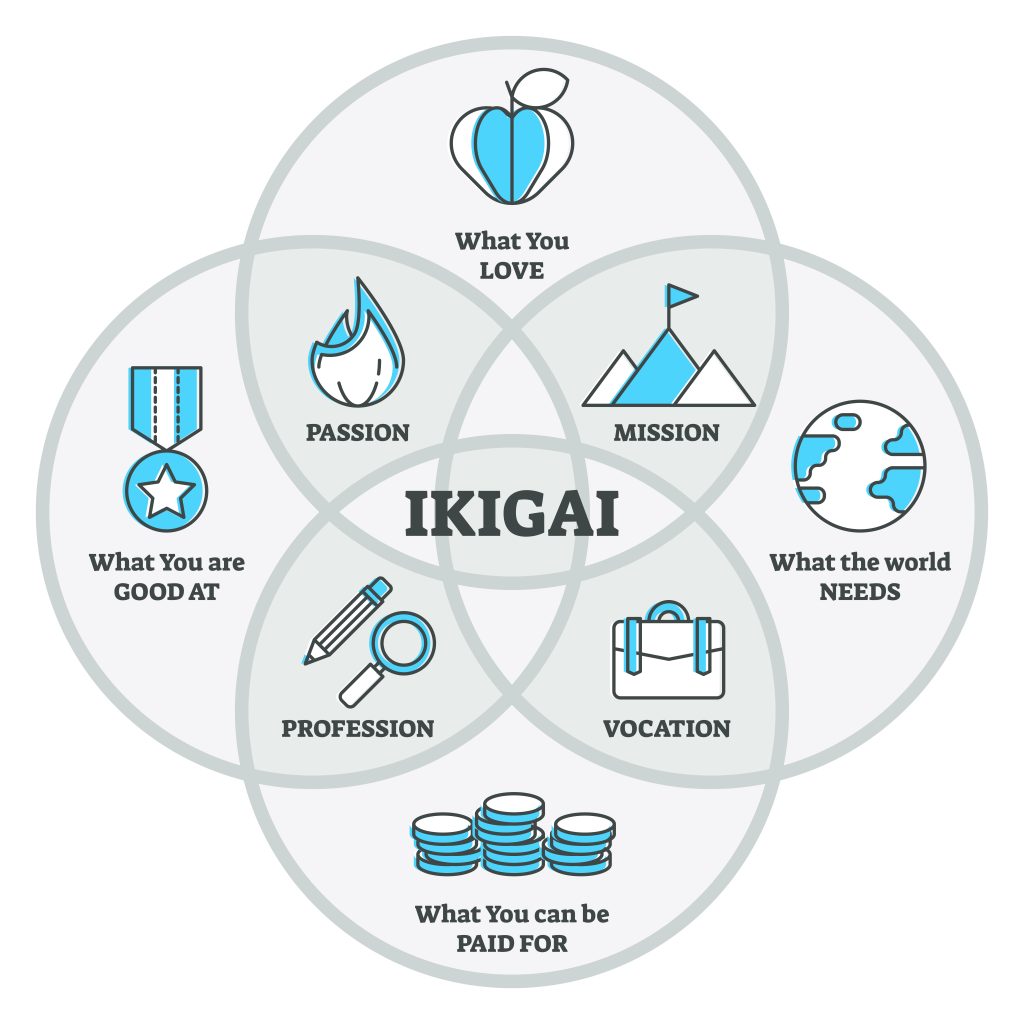What gets you out of bed in the morning? Keeping your engagement at work is a main challenge in the demanding and fast-paced business environment of today and COVID-19 pandemic added to the overall levels of anxiety impeding good mood and productivity. Amid the “Great Resignation” trend following the pandemic, three in four workers are actively thinking about quitting their jobs. What is the best time to reflect on your personal motivation if not after times of crisis? How about finding your “Ikigai”?
The land of the rising sun has given us many things, not only in terms of technology products but also unique perspectives on life: From Kaizen, the concept describing “change for the better” to Kintsugi, the concept of celebrating flaws, Japan has paved the way for many interesting tips in life philosophy. Ikigai is one of them, applying to both work and everyday life.
What is Ikigai?
Ikigai is a Japanese concept, with no English translation, that combines the terms iki (= “alive” or “life”) and gai (= “benefit” or “worth”). Respective to the French term “raison d’être”, ikigai expresses the purpose of your life, the reason you jump out of bed in the morning, the reason of your existence, the “why” of your life. In this respect, it acts as a useful guide for living a meaningful life, because people are happier and more productive when they have a clear sense of direction in their life.
*4 qualities making up the Ikigai concept*
- what you love,
- what you are good at,
- what the world needs; and
- what you can be paid for.

There are several wellbeing concepts associated with the concept of ikigai. The first is the concept of flow, a concept introduced by the pioneer of positive psychology Dr. Mihaly Csikszentmihalyi, which describes a mental state of highest concentration where the individual achieves best productivity. Flow at the workplace means to stop struggling about work while increasing quality output and to get the feeling of achieving something rather than just keeping busy. Flow occurs when you are consistently doing something you love and that you are good at. From this aspect, flow might be seen as in connection with your ikigai, or activities that give your life meaning and purpose.
The second is mindfulness, a concept often seen at SAFETY4SEA, describing the ability of oneself to be present in the moment. Our minds can be full of sort things, so we may lack complete awareness in what we are doing. Mindfulness is a type of meditation in which you focus on being intensely aware of what you are sensing and feeling in the moment, without interpretation or judgement. This can make it a useful tool to reduce stress, anxiety, depression, and pain. The current way of life constantly makes us busy planning the next thing, forgetting that “life is what happens when we’re busy making plans.” Much like mindfulness, the key to ikigai is to be aware of the present moment.
Ikigai and the shipping career
A main component of ikigai is feeling that your work makes a difference in people’s lives. By its nature, shipping, a vital pillar of the world’s economy covering people’s everyday needs, occupies people who should feel fulfilled in this respect: The 1.7 million seafarers on the 61,000 ships plying the world’s seas globally are responsible for delivering 80% of the world’s transported goods. Without shipping, people would be left without most of their basic everyday necessities and some countries would find it difficult to even survive.
Often, people who finally get their “dream job” refer to their work as their “baby” and are proud of “watching it grow”. These people have obviously found their Ikigai, validating their life purpose through their work. However, Ikigai can also be found outside work; many people find it in growing a family, travelling, or in just a hobby, like running.
Achieving ikigai at the workplace
Stating a clear mission statement: A clear communication about what the organization exactly stands for enables the transparency required for building a true sense of community-building, which consequently adds to the feeling of purpose.
Lead by example: Business leaders account for a great part of the team’s overall sense of purpose. Among the many complex requirements that make up a leader, it is therefore of vital importance that the assigned team members have found their Ikigai in order to inspire it and cultivate it to the rest of the team. It becomes understood that ikigai starts as a personal matter, which can be extended to work and life interactions. Japanese neuroscientist Ken Mogi identifies the five central pillars of ikigai as:
- Starting small (The importance of small steps for achieving your goals)
- Releasing yourself (Finding happiness through accepting yourself)
- Harmony and sustainability (Being mindful of your impact on others)
- The joy of little things (Like the first sips of a morning coffee)
- Being in the here and now (Be mindful).
Trace your values: Once you discovered what you love, what you are good at, what the world needs; and what you can be paid for, you should decide your “core values”. For example, are you a career-oriented or more of a work-life balance individual? What ideals characterize you? Identifying them early in your business life is important because a job that does not match your values can disrupt your sense of purpose. Don’t forget, roughly 90,000 hours of our lifetime are at work.






























































